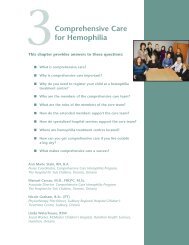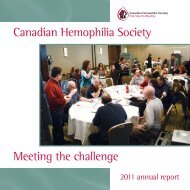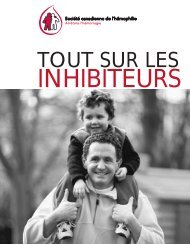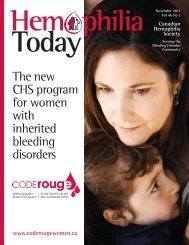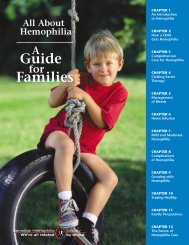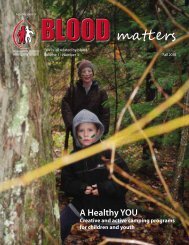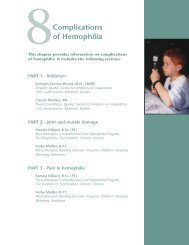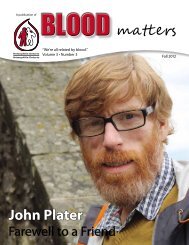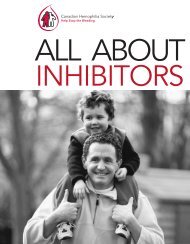14 HEMOPHILIA TODAY PHYSICAL FITNESSSUMMER 2002AND BLEEDING DISORDERSas an equal in these activities. As he gets“too cool” to be seen with his family, hecan bring a friend along on these outings.What is an acceptable level of risk?Discuss this with your hemophiliatreatment team. Football is notrecommended, but soccer might beacceptable. Bicycle riding is usuallyencouraged (with a helmet, of course) buthorseback riding might be more risky.Can you get proper equipment for yourchild and does it fit properly? If the answerto either of these is “no”, the decision ismade for you.If you live in a smaller town, yourchoices might be more limited. If you livein a real hockey town, you might have tosuccumb to the pressure and let your sonat least learn how to skate. There is somemerit to letting your son participate, learnthe skills and the rules of the game, anddevelop an interest in the sport. As he getsolder and more contact is involved, he mayfind that there are too many injuries to goon playing. But he may have the skills toallow him to referee or coach.If you choose this route, there are thingsyou can do to minimize the risk. Find outas much as you can about the coaches andtheir attitudes. Do they have a “play towin” or a “play to play” philosophy? Doeseveryone get a chance to play, or only thestars? Do they emphasize skilldevelopment and sportsmanship orwinning at any cost? If your child is injuredand has to sit out, will they be supportiveor will they be negative because your sonhas let the team down?There are other things to consider thathave nothing to do with hemophilia. Whatactivities are suitable for your family?There are parents whose children do NOThave hemophilia who draw the line atcontact sports. Other families are unable tocommit themselves to early morningpractices, out-of-town tournaments and soon, so participation in activities requiringthat level of commitment is not even anoption.Believe it or not, and despite the factthat “EVERYONE else’s parents let THEIRkids play”, children do survive these familyrules. Your child’s joints need to last alifetime. Help him choose wisely.Isla Crawford, Certified Child Life Specialist,works at the Children’s Hospital inWinnipeg.INTERVIEW BY KATHY MULDERSilvana’s StoryGrowing up with aTarget JointSilvana is a vivacious teenager whoenjoys music, sports, drawing andbeing with her friends. She is atypical teenager except that she has ableeding disorder. She agreed to beinterviewed so that her story might helpother kids.KM: You were little when you startedhaving trouble with your joints. What wasthat like?S: It was hard for my parents. I wanted todo stuff. They always wanted to overprotectme. When I started school, there were lotsof games I couldn’t play and I had to sitout. I wanted to rebel, but if I played, I justgot hurt and that was no good either.KM: How did the other kids treat youwhen you had to sit out?S: They treated me like I was some tickingtime bomb that would blow up any minuteor else they treated me like fragile glass.Some kids started a rumour that I hadcancer. Some kids thought I had somehorrible contagious disease that they wouldcatch from me.KM: How did you handle thosemisconceptions?S: When I was small, I went to the teachersfor help. Now I have good friends that helpme and they understand. Even now,sometimes when I meet new people andthey find out I have a bleeding disorder,they get all nervous, and I feel like a freak.But my friends help a lot.KM: You must have missed a lot of thingsin Phys Ed. What was that like?S: Well, this past year was especially bad.The Phys Ed teacher was also the footballcoach and I bet I had to sit out at least aquarter of the classes because they weredoing things like lacrosse, football, andsoccer. In a co-ed class that can get prettyrough so I couldn’t take the chance ofgetting hurt. The worst is actually all-girls’basketball. They girls scratch and grab andget really rough. It’s actually less dangerousto play basketball with just the boys!KM: Do you think there are things thatyou missed out on because of yourbleeding disorder or your target joint?S: I missed out on being active. I couldn’tkeep up with my friends. They would go tosoccer lessons, Judo lessons and stuff, and Iwould have liked to do those things, too.But I try not to think about it, and I reallytry not to dwell on it.KM: You recently started an exerciseprogram. What changes have you noticedsince you started exercising more regularly?S: I feel more fit. I can do more. I have nothad any recent injuries, especially my targetelbow. I am doing yoga, too, which hasmade me stronger and more flexible. Ihope that if I continue, I will be morecapable and maybe even try soccer. I lovesoccer.KM: Do you have any “words of wisdom”for other kids who can’t do all the thingsthey would like to?S: Don’t worry. It seems like a big thingwhen you are little, but it really isn’t. Takecare of yourself. Be thankful for yourfamily and your teachers who are there tohelp you and watch out for you. And whenyou are older, like an adult, try to teachothers about what you went through andthat it’s not that bad.
HEMOPHILIA TODAY PHYSICAL FITNESSSUMMER 2002AND BLEEDING DISORDERS15HEMOPHILIA AND SPORTSFOR THE SCHOOL-AGEDCHILD:To Play or Not to Play?Brenda ElliottPhysiotherapist, Children’s Hospital ofEastern OntarioOne of the most frequently askedquestions in hemophilia is “Shouldmy child participate in sports?” Theanswer to this question is an easy one, “Yes”.Let me give you some of the reasons why.First of all, the physical benefits thatschool-aged children will gain are wellreported in the hemophilia literature.Increased strength of the musclessurrounding the joints helps to protect themand possibly reduces bleeds. Musculoskeletalfitness is important and may help to reducethe occurrences of spontaneous bleeds.Next the psychological and emotionalneeds of the child with hemophilia need to beconsidered. A child gains self-esteem andconfidence when participating in a sport thathe enjoys. When he participates in an activitythat he enjoys and he can perform reasonablywell, it boosts his confidence. What childdoesn’t seek the approval and praise of hisparents, coach and peers? Sports can give allof this to children and adolescents.The next most frequently asked questionsare “Which sports should my childparticipate in?” and “What are safe limits?”Unfortunately, the answers to these questionsare not clear cut. There are many differentopinions as to which sports are safe andwhich ones are not. Before diving into thisdebate, one should consider some importantfactors.The child’s body type, bleeding history,present condition of joints, target joints andseverity of hemophilia should be considered.If your child has severe hemophilia, contactsports such as hockey, football and martialarts, for example, may not be the ones tochoose. If your child has moderatehemophilia and has an ankle that is a targetjoint, long distance running may not be agood choice for him. Swimming is a sportthat is safe for most people and is verybeneficial for developing strength andendurance. Since it is not an impact sport, itis very easy on joints and may be a goodchoice for a person with hemophilia. Thereare many circumstances surrounding yourchild and his condition and these mayinfluence the type of sport he chooses. Thebest piece of advice is to discuss the sportingoptions with your physiotherapist, physicianand nurse. They also may refer you to therecent publication by the World Federation ofHemophilia, Go For It.Once the sport has been chosen, adequatepreparation is required. You should discussyour choice with the hemophilia team so theycan make any recommendations. Properconditioning and practice for the sport arerequired in order to prevent injuries. Thehemophilia team may also recommend factorinfusion prior to sports. Proper equipmentsuch as helmets and protective gear may beessential for the sport of choice. It isimperative that these meet standards and areworn properly.People often ask the question “Should thesport I choose be recreational, competitive oreven organized?” Again, the answer is notclear cut, but let me share some thoughts. Ingeneral, organized sports tend to be bettersupervised and, when required, haveprotective equipment available or mandatory.“Pick up” games can be more rowdy, not assupervised, and protective gear tends not tobe used. Also, organized sports have a setschedule and, if infusion is necessary beforethe sport, it can be done in a systematicfashion. Therefore, in many ways, organizedactivities may have an edge.Competitive sports (for example, soccerand basketball) may be suitable when a childis young and less contact is required.However, they may become a concern as thechild ages and the sport becomes moreaggressive. Football and hockey, which startout as non-contact sports, usually do changeto contact at a more competitive level andmay not be good choices. These points needto be considered when choosing the sportthat will suit the child. Parents know theirchild best and need to keep their personalitiesin mind. Perhaps these choices will be easy tomake as your child ages or maybe they will bea major challenge in the teenage years. That iswhy education as to what sports are friendlyand which ones may be less favourable isimportant from a very early age.The last thing everyone should knowabout is injury prevention. Injuries are goingto happen in sports; it doesn’t matter whetheryou have hemophilia or not. In order todecrease the risk, make sure a proper warmupand stretching program is done.What should be done if an injury doesoccur? Never play through an injury and usethe acronym RICE & Factor Replacement.R=rest, I=ice, C=compression, E=elevation.Parents may be concerned about the risksinvolved with sports but it is essential thatchildren with hemophilia learn what they canand can not do physically. Children willexplore no matter what and it is part ofgrowing up. Let’s educate them properly andthen everyone will enjoy sports and life!Remember - the goal is to be happy!PREPARATION—MORE THANJUST FACTORREPLACEMENTKathy Mulder and Greig BlameyPhysiotherapists, WinnipegThinking of trying a new activity?One that sounds like fun but that youhave never done before? Or maybeone that your hemophilia treatmentcentre would discourage?Before you start, “A littlepreparation goes a long way,” saysGlen, a young adult with severehemophilia A. “I’ve done some crazythings that I know the hemophilia teamwould never approve of. I even wentsky-diving. But I don’t take risks. Iprepare myself as much as I can. Thenif I think I can handle it, I try it.”We certainly cannot endorse highspeed,high-impact, and high risk activitiessuch as some of the ones Glen has tried.But his advice applies to most activitiesthat you might be tempted to try.Glen recommends:1. Learn as much as you can aboutthe activity. Read about it, watch otherpeople doing it. Look closely at what isinvolved. Pay close attention to themovements and impact on joints ormuscles, especially if you have aproblem joint.2. Get information about whatequipment is necessary for the activity.Can it be rented or do you have to buyit? Can you get the proper fit?Equipment that fits poorly can beworse than no equipment at all.3. Find out if there are some preactivityexercises or training that wouldbe helpful. Do you need to strengthenyour ankles or knees first?4. Take lessons from a qualified andexperienced instructor. Your buddymight mean well, but does he have allthe knowledge needed to get yousafely through the activity?5. Start out with people who haveexperience. (See above.)6. Talk it over with your treatmentteam. Be sure that you understand allthe potential injuries and theirconsequences. Perhaps your teammembers know of people who tried thesame activity. If they were successful,they might have tips. If they weren’tsuccessful, you might want toreconsider.7. If the risks outweigh thebenefits, think again. It really might notbe worth it.



